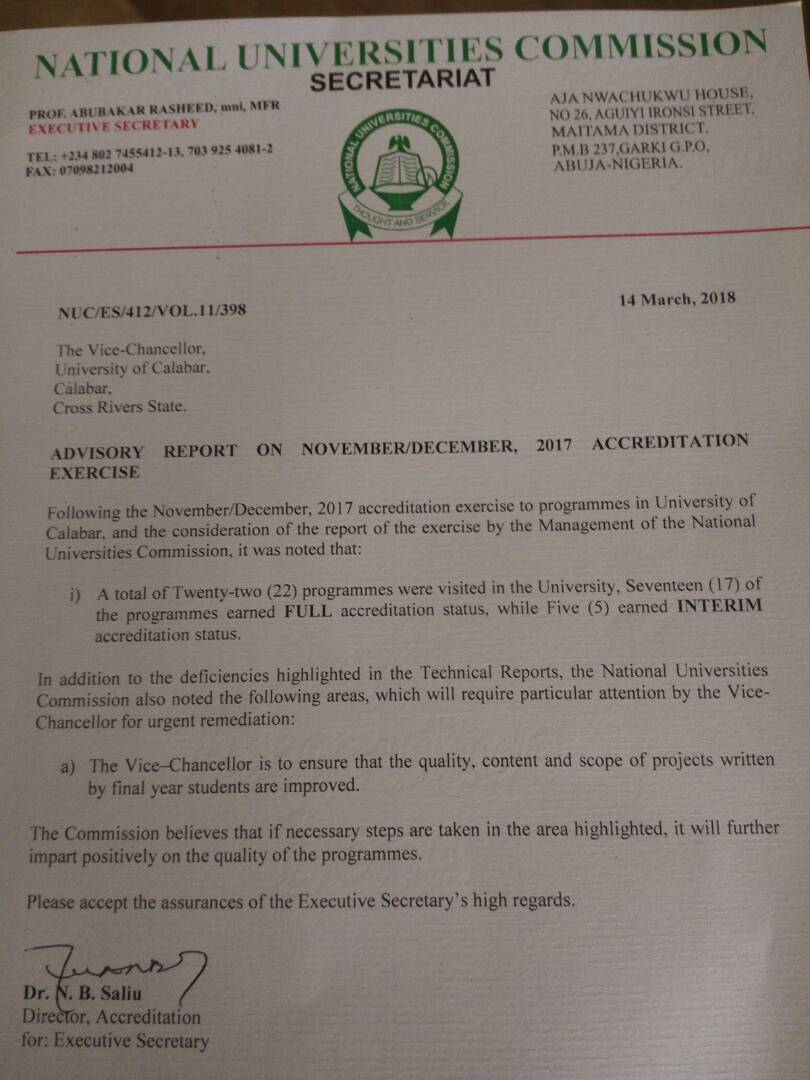By Daniel Edu
A total of twenty two (22) programs in the University of Calabar have been issued different classes of accreditation following the conclusion of the November/December 2017 accreditation exercise carried out by the National Universities Commission (NUC).
Seventeen (17) out of the 22 bagged full accreditation while five (5) were issued interim accreditation documents sighted by CrossRiverWatch reveal.
The first document titled: “Results Of The November/December 2017 Accreditation Of Academic Programmes In Nigerian Universities,” with reference number, “NUC/ES/412/VOL.11/397,” dated March 7, 2018 and addressed to the Vice Chancellor of the University listed the programs accredited as follows:
AGRICULTURE
Fisheries and Aquaculture – Interim
Environment Resource Management – Full
BASIC MEDICAL SCIENCE
Human Anatomy – Full
Human Physiology – Full
Radiography – Full
EDUCATION
Adult Education – Interim
Educational Administration and Planning – Full
Guidance and Counseling – Full
Educational Technology – Full
Elementary Technology – Full
Education English – Full
Education Geography – Full
LAW
Law – Full
SCIENCE
Applied Chemistry – Interim
Pure Chemistry – Interim
Geology – Interim
Mathematics – Full
Physics – Full
Statistics – Full
SOCIAL SCIENCES
Policy and Administration Studies – Full
Political Science – Full
The second letter titled: “Advisory Report On November/Decemeber, 2017 Accreditation Exercise,” with reference number, “NUC/ES/412/VOL.11/398,” dated March 14, 2018 and addressed to the Vice Chancellor of the institution, advised the institution on certain deficiencies.
It read in part: In addition to the deficiencies highlighted in the Technical Reports, the National Universities Commision also noted the following areas, which will require particular attention by the Vice-Chancellor for urgent remediation.
“The Vice-Chancellor is to ensure that the quality, content and scope of projects written by the final year students are improved.
“The commission believes that if necessary steps are taken in the area highlighted, it will further impart positively on the quality of the programs.”
The “full accreditation status is valid for a period of five years,” while the Interim accreditation status is valid for two years “after which the programmes will be re-visited,” the letter read.
The NUC also said that programs that earn interim status after two visits shall revert to denied accreditation status which has several implications.
These, according to the letter are: “Immediate ban on student admission in such programmes; Certificates issued to students admitted into such programmes after the ban admission, will not be recognized. (Students who are currently enrolled on programme will not be affected); and such students admitted into programmes with Denied accreditation status on the ban, shall on graduation be denied call-up into the National Youth Service Corps scheme.”
Both documents were signed by the Director of Accreditation in the NUC, Dr. N. B. Saliu.
Since You Are Here, Support Good JournalismCrossRiverWatch was founded on the ideals of deploying tech tools to report in an ethical manner, news, views and analysis with a narrative that ensures transparency in governance, a good society and an accountable democracy. Everyone appreciates good journalism but it costs a lot of money. Nonetheless, it cannot be sacrificed on the altar of news commercialization. Consider making a modest contribution to support CrossRiverWatch's journalism of credibility and integrity in order to ensure that all have continuous free access to our noble endeavor. CLICK HERE |
New Feature: Don't miss any of our news again.Get all our articles in your facebook chat box.Click the Facebook Messenger Icon below to subscribe now
Text Advert by CRWatch :Place Yours

Will You To Learn How To Make Millions Of Naira Making Special Creams From Your Kitchen?.Click Here
Expose Your Business And Make More Sales. Advertise On CrossRiverWatch.com Today





Leave feedback about this